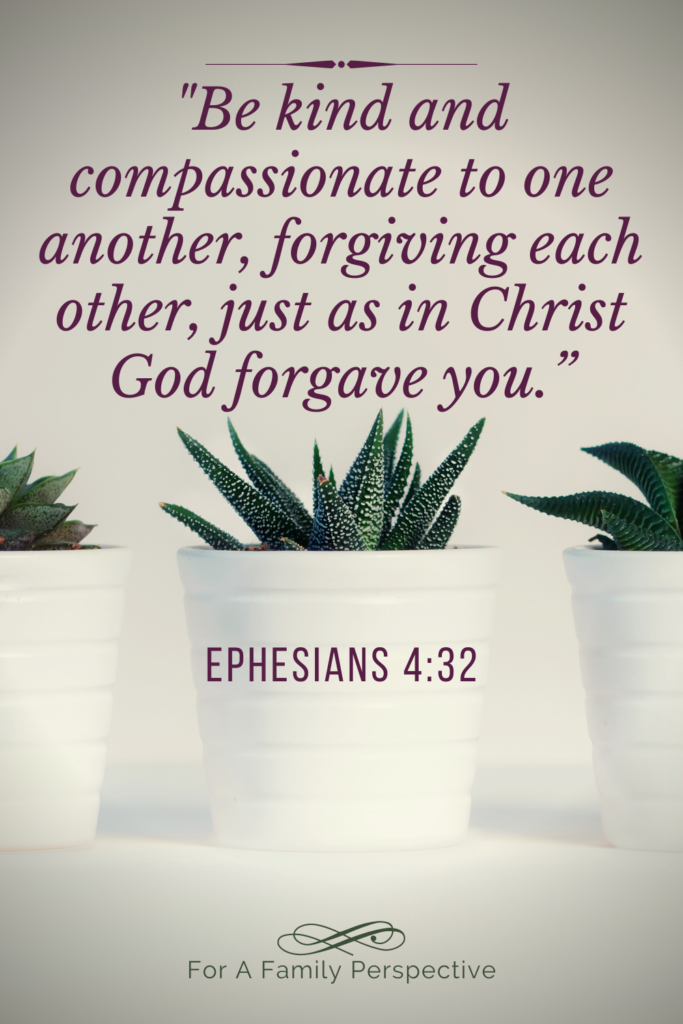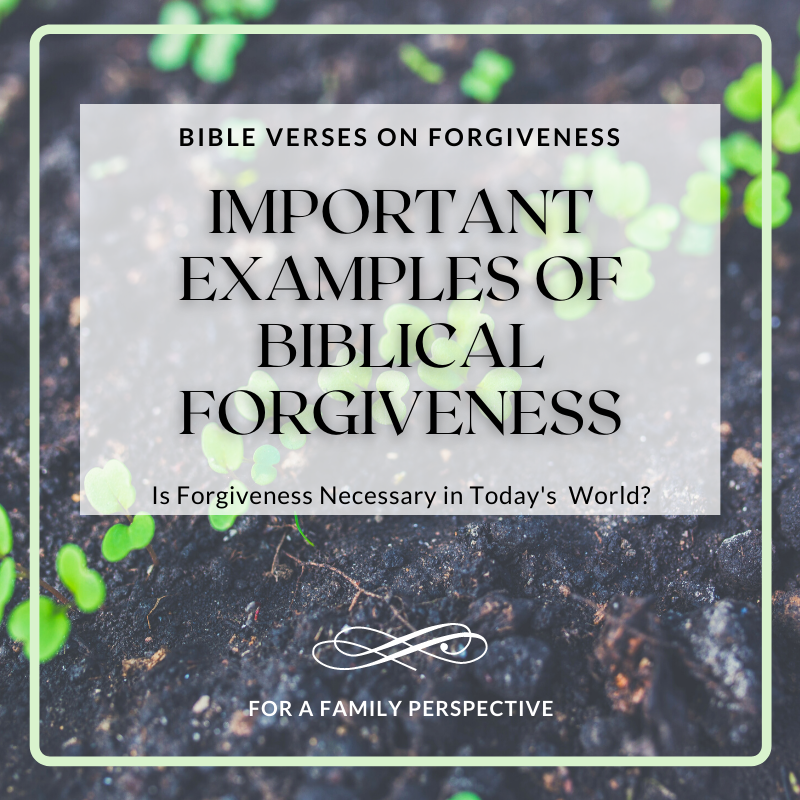What does the Bible say about forgiveness? What are some examples of forgiveness? Are there particular stories or verses that one can read and be assured of the importance of giving and receiving forgiveness? We will cover all of these questions and more as we look into the need and value of forgiveness.
Feel free to jump ahead using the table of contents below if you want skip stories you are familiar with or perhaps read it all the way through to be reminded of an old truth or discover a new one.
Is Forgiveness Outdated and Old Fashioned?
Maintaining right relationships with other people is rarely valued, especially in today’s fast paced world. In fact, the opposite is true. If anything, what is valued is making the person who offended you pay. Whether it is settling a nasty divorce or leaving a 1 star rating on a restaurant review, people today show very little mercy and forgiveness. Wounded people drag their offenders into the arena of public opinion and counter attack on social media platforms and in constant conversations with whomever will listen to them. People drop “friends” for minor offenses and discarded them in search for someone else. It seems people put more care into their car, their pet, or even clothes than they do their relationships. The art of forgiveness appears lost and countercultural in the fast pace of today’s “me-centric” world.
When it comes to forgiveness when raising children and cultivating strong families and communities, one must consider, is there value in teaching forgiveness, and if so, how?
(Find out more about why we care about cultivating strong families by reading A Better Family)
Love and Forgiveness are Related
For Christians, one of the cornerstone characteristics of God is the concept of love. In a way, love can be defined as caring for and wanting the best for someone else, even when that person is selfish or offends you. Think about it. It is easy to love someone who loves you back, and is even easier when that person still wants the best for you on your worst day. Our Heavenly Father is love. He loves us so much that He is willing to forgive us of a multitude of personal offenses against Him. It is no wonder that right next to the cornerstone concept of love, is the concept of forgiveness.
Proverbs 17:9 says “Love prospers when a fault is forgiven, but dwelling on it separates close friends.” Grasp hold of this truth; forgiveness and love go hand-in-hand. Love prospers when forgiveness is provided. Christians should love as God loved. In the beloved passage of John 3, we treasure the fact that God so loved the world, that he offered forgiveness to anyone who sought it. Forgive those who seek it. Make love prosper through forgiveness. Peter the apostle said it even better, “Above all, love one another deeply, because love covers over a multitude of sins” (1 Peter 4:8).
So, is forgiveness still necessary in today’s culture?
Not just yes, but maybe more so than ever.
So, what are a few examples of Bible stories on the subject of forgiveness? How does one learn these truths for oneself and also teach them to others, especially children? Let’s take a few minutes to explore some of the more beloved stories on forgiveness.

Check out “6 Ways to Empower Children to Forgive”
Forgiveness is Most Powerful, When it is Least Expected
Jacob and Esau grew up as favorites, one to their father and the other to their mother. This caused strife within the family and resulted in a tangled web of lies, deceit, and eventual estrangement. Jacob stole the family blessing and then fled in danger of his life as his brother nurtured a stance of hate towards Jacob and eventually vowed to kill him.
As a result Jacob would spend years away from family living in other lands and slowly growing his own fortune and family. After years of being away, God moves him back towards the land of his family, and towards Esau. A frightened Jacob expects Esau to fulfill his vow of judgment upon him. Jacob knows what he deserves and he expects it. However, the unexpected happens. He is greeted with open arms instead of the sword. His brother extends forgiveness instead of judgment. He offers peace instead of pain.
To Forgive is To Be Like God
Jacob’s response is powerfully insightful. After their tearful embrace he tells Esau “For to see your face is like seeing the face of God, now that you have received me favorably” (Genesis 33:10). Extending unmerited forgiveness is powerful. Jacob knew what he had done was wrong. He expected some form of judgement. Should his brother take portions of his flocks and wealth? Would he still want to take his life? Jacob was given a loving embrace instead of the expected death. This caused Jacob to see the face of God in his brother.
To love the unlovable and forgive the unforgivable is to manifest within oneself the very characteristics of God. That is immensely powerful!
Forgiveness Enables Reconciliation
Within the Old Testament, the story of Joseph is a wonderful story on many levels. It is loaded with family drama, of broken people following selfish agendas, of fathers playing favorites, blended families, boasting, jealousy, grudges, hate, schemes, lies, power, and heartache. But on the other hand it also shines with courage, moral virtues, personal character, trust, faithfulness, reconciliation, duty, love, tenderness, joy, and of course forgiveness.
Most people are familiar with the story, if you are not, you can find it in Genesis, chapters 37-50. We are unable to capture its depth and richness in a few paragraphs, but I do want to highlight a couple of key takeaways from this story.
We Are All Flawed By Sin
All the characters in this story are flawed and are in need of forgiveness. This is a key principle to hold onto as we talk through the idea of forgiveness. It will be the lynch pin of all the following stories and verses and is quite frankly the lynchpin of the entire Bible and its story of Redemption. Everyone is flawed. You fail to measure up. I have sinned. Therefor everyone is in need of forgiveness.
Even Joseph was marred by pride and boasting. There was something inside of him that desired to be the greatest among his brothers. He flaunted it. The story centers on Joseph being his father’s favorite son. As a result Joseph is given a magnificent coat of many colors. A sign of favor and wealth that Joseph willingly flaunted in front of his brothers. He paraded before his brothers the dreams he had that told of how they should all bow down to him. Yes, not even Joseph was innocent in the story, he, like all of us was flawed and in need of forgiveness.
Do Not Let Hurts Fester
One could even argue that Joseph should have been the instigator of seeking forgiveness. You see, Joseph’s brothers did not beat him, devise a path towards murder, and eventually sell him as a slave based upon a single instance of rage or disagreement. No, this was something that festered for a long time. Grown men driven to wits end by a young boy. This is a family culture that did not value forgiveness.
Ironically Jacob, Joseph’s father, has his own forgiveness story that he apparently had not learned from. Jacob does not appear to try and instill forgiveness into the family culture. As a result, beneath the surface, resentment and selfishness reigned.
Seeking Forgiveness Must be Intentional
Families must diligently root out these issues early and often. Now, even Joseph will be the first to say that what his brothers meant for evil, God meant for good. Our Heavenly Father is in the business of restoration, and reconciliation, but that does not mean that earthly fathers should be negligent in instilling forgiveness into the family way of life.
The story continues with Joseph’s brothers selling him into slavery, lies being told and alibis being fabricated. A father’s heart is broken and brothers live in guilt for years. The thing to take away from this part of the story is that lack of forgiveness results in bitterness. And bitterness destroys. It destroys relationships, it destroys the individual, it destroys families, and it destroys communities. No doubt Joseph’s brothers had to daily face the grief of their father and live with the guilt of their actions. Even years later, when unknowingly confronted by Joseph as an Egyptian ruler, they begged not to have to leave Benjamin behind because their father would most likely die if something were to happen to him as the loss of Joseph had already drained him of life.
Focus on Forgiveness to Eliminate Undesirable Traits and Develop Worthy Ones
Families should openly discuss and ask about areas of forgiveness. Start with the little things and have the easy discussions. Things like hurt feelings at being left out, or verbal scolding’s that perhaps were unjustified. As parents we have to lead by example. Be the first to seek forgiveness if you come across as harsh or uninterested or distracted. One must practice these smaller daily activities in order to be open and ready to discuss the big ones in life. The Apostle Paul hands us an instructional passage on this topic in Ephesians 4:31 & 32.
“Get rid of all bitterness, rage, and anger, brawling, and slander, along with every form of malice. Be kind and compassionate to one another, forgiving each other, just as in Christ God forgave you.”

Forgiveness is Not Easy
The amazing thing about these verses is that our Heavenly Father knows it is hard to get rid of bitterness, and rage, and malice. It is hard to think about not being in a rage when those feelings are bombarding you. It is hard to not be bitter when you have been wounded. It’s almost as if we have no control over those things in some ways. Emotions drive us to uncertain ends at times. But the scripture does provide us with something we can control. We can control the amount of kindness we show every day. Compassion can be controlled towards others. We can choose to forgive.
As a quick note, the Greek word for forgiveness is aphesis which literally means to send away or leave behind. To apply forgiveness is to remit (pardon or cancel) a debt or obligation. I like the way this is an action word, to send away or leave behind a grievance. But to leave something behind means to move towards something else.
Forgiveness is a Process and Every Process Requires that First Step
I see it as almost a progression. Being kind is a single action, chosen for a particular instance. The storms of life could be raging within and around and I can choose to be kind for a brief moment. Baby steps! Increase those moments every day. Find more ways to participate in acts of kindness.
Then, as I develop habits of kindness, something begins to grow within me. The act of kindness blossoms into something deeper and more meaningful. Compassion takes hold and I begin to care for that person or situation at a more profound level. I relate. I feel empathy and compulsion to do more, be more.
That matures into the ability to forgive others even when we are hurt at the deepest levels. True forgiveness is not easy. It is way beyond the playground exchange of “I’m sorry” and “that’s okay”. True forgiveness comes from a transformed life that loves others as one love themselves. It is actually a great mystery, but the formula is sound.
Forgiveness and Bitterness Reside at the End of Two Different Paths
Individuals who are practicing kindness, compassion and forgiveness, are not going to harbor bitterness, rage, brawling, slander, and malice. They occupy the same space within our souls. To hold on to one is to neglect the other. One cannot be a kind slanderer. Just like one cannot be a compassionate brawler. It is also not possible to be a bitter forgiver. Choose and nurture one, and the other will naturally become less and die. Follow Paul’s advice; focus on good and get rid of the unnecessary.
Jesus Teaches on Forgiveness
Christians sometimes gravitate towards the New Testament for most of their teaching, so what examples of forgiveness does our Lord Jesus Christ offer? A great starting point is his teaching from the sermon on the mount.
Importance of Forgiveness: In the Sermon on the Mount, Jesus says if You Don’t Forgive, God Cannot Forgive You
Jesus teaches his followers how to pray the Lord’s Prayer in Matthew chapter 6. Specifically, in verse 14, he finishes the prayer with an instruction on the importance of forgiveness. He says if we forgive others when they sin against us, God will forgive us when we sin against him. But if we do not forgive, then God will not forgive. The importance of forgiveness is in having a willing heart. To imitate God is to forgive.
Forgive and Be Forgiven
The teaching is straight forward. Pray for forgiveness and forgive others. Forgive, and you will be forgiven. Withhold forgiveness, and have forgiveness withheld from you. Like so much of the rest of the Sermon on the Mount, there are deeper layers beneath the basic teaching. In this case, the issue is one of the heart. Those who do not value their own grace will not forgive others. True grace is when a perfect God forgives sinful people.
How Many Times Should I Forgive?
To drive that point home, Jesus goes on to tell several stories emphasizing this truth. In Matthew 18:21 it says that “then Peter came to Jesus and asked, “Lord, how many times shall I forgive my brother or sister who sins against me? Up to seven times?” Jesus, again going for the heart of the matter says, “not seven, but seventy-seven times!” A heart willing to count, is a heart not willing to forgive.
How Many Times Will God Forgive me?
The irony is that in hearing Jesus’s previous teaching, Peter is essentially asking, how many times is God willing to forgive me? That would have been a wonderful question. Jesus basically answers the question that Peter didn’t ask. He says forgive others and God will forgive you, and then he tells us to open the ledger book and offer unlimited forgiveness, essentially showing the God’s forgiveness is also endless.
Ah, but there is always someone with the statement that when Jesus said that, he didn’t take into account my particular situation. He doesn’t understand how bad this person was to me or what terrible actions they committed. Is that true though? Jesus followed Peter’s question with a parable. The parable of the unforgiving servant.
Importance of Forgiveness: In the Parable of the Debtors Jesus Points Out How Much We Are Forgiven so we Should Forgive as a Result of that if Nothing Else
A man owed a huge sum to the king. A sum so large that it would be impossible for him to ever pay it back in a lifetime of hard work by him and his family. The man begged and pleaded and promised to repay. The king had mercy and not only allowed him the chance to stay a free man, but he completely struck the debt from the recorded. The ledger books were stamped, paid in full.
As the joyous man made his way home, he ran into a fellow servant who owed him money, less than a year’s wage. He assaults his fellow servant and demands the money immediately. The man begged in a similar pattern to way the forgiven man had just pleaded and yet this wicked servant had no mercy. He threw him into prison until the debt was paid.
Forgiveness is Extending Unmerited Grace
The king found out and was angered by the wicked servant’s lack of forgiveness towards his fellow servant. He has the wicked servant thrown into jail forever. Then Jesus says “this is how my heavenly Father will treat you unless you forgive your brother and sister from your heart” (Matthew 18:35). God takes forgiveness seriously and so must we. To an infinitely Holy God our sins are infinitely egregious to the point of never being able to pay them off. Yet he shows us unwarranted, unexpected, and powerful grace and mercy. Can we really afford to hold petty grudges against each other?
The Culture of One’s Heart is Defined By the Extension or Withholding of Forgiveness
Just to hammer home the teaching to Peter, Jesus concludes the story by saying forgive from the heart. Forgiveness is not something you muster up the strength to offer once, or only in particular circumstances. Rather it is a condition or culture of the heart that constantly, consistently, and continuously forgives. Therefore, it requires training and nurturing. Teach your children at an early age to seek and extend forgiveness.
In the Gospel of Luke, Jesus told a similar, yet difference parable concerning two debtors. In Luke 7:41 Jesus is dining at the home of a Pharisee and tells of a moneylender who had two debtors, the first owing 500 denarii and the other owing 50 denarii. During the time that Jesus was telling the parable, a single denarius was a day’s wages for a laborer. So, the sum was again significant. As it turns out neither were able to pay. The moneylender ended up canceling both of their debts.
Jesus pointedly asked his host, which of these two is likely to love the moneylender more? The Pharisee answers that the one with the greater debt. Jesus agrees and then says this woman who has been anointing my feet with tears is showing great love because her sins are many. She has been forgiven much, therefore she loves much.
Great Forgiveness Equals Great Love
Do you find yourself struggling to love others the way God loves? The question you might want to ask is, am I forgiving the way God forgives? An even better question might be; have I truly considered how much I have been forgiven? The combination of these two stories show that that love we must forgive as we have been forgiven. We also must love and the only way to really learn to love is to realize how much we have been forgiven as well.
A person who is self-aware of the fact that they have been forgiven much, will love much. They will not have capacity within their hearts to withhold forgiveness to others or carry a grudge. Conversely, those who constantly bear grudges against other people have not come to understand their own status of forgiveness. God has canceled your debt! It was a debt you could never repay. You are free. Don’t imprison yourself with bitterness. Live free.
Importance of Forgiveness: In the Parable of the Prodigal Son Jesus Says Reconciliation Through Forgiveness is a Prize of Important Relationships
A little later on in Luke 15:11-32, Jesus provides another example of forgiveness. Perhaps one of the most well known in all the Bible. In the story of the prodigal son, Jesus highlights a few wonderful truths. First, he told a story that shows the calloused devastation of evil and sin upon relationships. The son, thinking only of himself and his selfish desires wishes his father were dead so he could spend his inheritance. Not being able to wait until his father dies, he instead asked for his inheritance early and then leaves the family to live a life of self-absorbed sin. The son willingly, intentionally, and systematically destroyed his relationship with his father.
Secondly, Jesus points towards reconciliation in that even though the son knew he had disowned his father and shamed him, he figured it would still be worthwhile to repair the relationship at least to the point of being a servant in his father’s house. One may not be to undue the terrible things one has done, but at least attempt to establish a lesser relationship if able.
Seek to Reconcile to Some Lesser Level if Nothing Else
For instance, a spouse who has left and filed for divorce, may not be able to reconcile to the point of entering back into a loving marriage with their spouse, but at least attempt to establish a friendship. Do not allow bitterness to further erode your soul.
Finally, the Lord Jesus concludes with the father restoring the relationship to not only what it was before, but to what it should have always been. He puts a robe on the son, and ring, and throws a party. He forgives fully with reckless abandon. This is of course is a parable of Jesus showing God’s forgiveness and love for us, as his children. Jesus sets the standard high!
Beyond Teaching, Jesus Modeled Forgiveness
Jesus set the standard not only in word but deed. On the day he was crucified, he was mocked relentlessly by those in authority, by those who had days before praised his coming as the kingdom of heaven, by his neighbors, by strangers, even by two thieves condemned to die with him. Jesus confidently proclaimed his love for us and provided the perfect example of forgiveness. Jesus said “Father forgive them, for they know not what they do” (Luke 23:34) in the final moments of his life here on earth as God was pouring out the full cup of wrath for the sins of the world. One of the thieves sought that forgiveness and Jesus in turn forgave and promised that today they would be in paradise together.
Right Relationship With God
So then, the importance of forgiveness is being in a right relationship with God. At the end of the day, forgiving family, forgiving others, even forgiving oneself, only goes so far. You must be right with God through forgiveness of your sins. Seek God’s forgiveness for your own shortcomings and failures.
But can God really forgive me if I have done terrible things? How can I know that God will forgive?
Hold Fast to the Treasure of Truth
We have this beautiful promise that we can treasure and hold onto. The apostle John makes it abundantly clear of this, we all have sin, but if we seek forgiveness God will give it. It’s a promise.
“If we claim to be without sin, we deceive ourselves and the truth is not in us. If we confess our sins, he is faithful and just and will forgive us our sins and purify us from all unrighteousness” (1 John 1:9).

God is Love, Therefore He Forgives
We see here the nature of God. Trust God. He cannot lie. God cannot be unfaithful to his word. You can trust him to remain true to his character. He is also just. Meaning, as one without sins and being fully holy, only he can provide justice for wrong actions. When he offers forgiveness for our sins, he is not sweeping our sins under the rug and ignoring them. Jesus Christ paid our debt in full. God in his justice demanded a penalty for sin, and Jesus took it upon himself. This is the good news of the entire redemption story of the Bible!
“For God so loved the world that he gave his only son, that whosoever believes in him, should not perish, but have eternal life.” – John 3:16
God’s love is for the whole world, so is his forgiveness. 1 John 2:2 says “He is the propitiation for our sins, and not for ours only but also for the sins of the whole world.”
God’s desire to offer us forgiveness comes from his love for us. Love is still relevant in today’s world. So is forgiveness. Our heavenly father loves us, therefore he forgives us. You too love, so you should forgive. You love your children, so teach them to forgive. By practicing forgiveness, you are loving others. Go out and love someone today!
Bible Verses on Forgiveness
Here are 11 additional Bible Verses on forgiveness to treasure in your heart.
Micah 7:19 – “He will again have compassion on us; he will tread our iniquities underfoot. You will cast all our sins into the depths of the sea.”
Isaiah 43:25 – “I, yes, I alone, will blot out your sins for my own sake and will never think of them again.”
Matthew 6:9-13 – The Lord’s Prayer – “Our Father in heaven, hallowed be your name. Your kingdom come. Your will be done, on earth as it is in heaven. Gives us this day, our daily bread. And forgive us our debts, as we also have forgiven our debtors. And do not bring us to a time of trial, but rescue us from the evil one.”
Colossians 3:13 – “Bear with each other and forgive one another if any of you has a grievance against someone. Forgive as the Lord forgave you.”
A Few Additional Verses
2 Chronicles 7:14 – “If my people, who are called by my name, will humble themselves and pray and seek my face and turn from their humble ways, then I will hear from heaven, and I will forgive their sin and will heal their land.”
Matthew 18:21-22 – “Then Peter came to Jesus and asked, ‘Lord, how many times shall I forgive my brother or sister who sins against me? Up to seven times?’ Jesus answered, ‘I tell you, not seven times, but seventy-seven times.”
Psalm 86:5 – “You Lord, are forgiving and good, abounding in love to all who call to you.”
Micah 7:18 – “Who is a God like you, who pardons sin and forgives the transgression of the remnant of his inheritance? You do not stay angry forever but delight to show mercy.”
1 John 2:2 – “He is the atoning sacrifice for our sins, and not only for ours but for the sins of the whole world.”
Acts 2:38 – “Then Peter replied, “Repent and be baptized, every one of you, in the name of Jesus Christ for the forgiveness of your sins. And you will receive the gift of the Holy Spirit.”
Colossians 1:13-14 – “For he has rescued us from the dominion of darkness and brought us into the kingdom of the Son he loves, in whom we have redemption, the forgiveness of sins.”











0 Comments